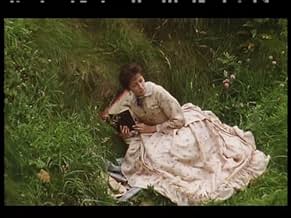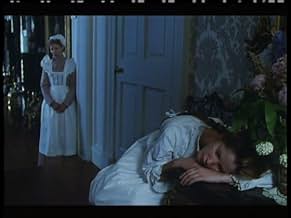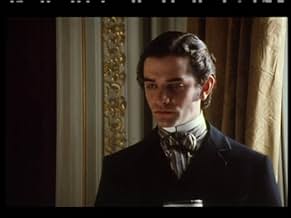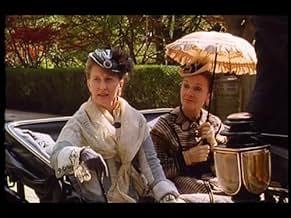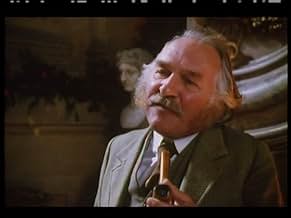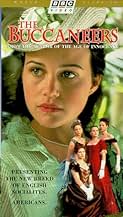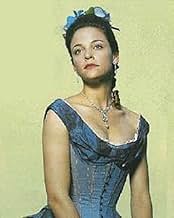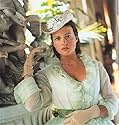Cuatro chicas estadounidenses van a Inglaterra a buscar marido.Cuatro chicas estadounidenses van a Inglaterra a buscar marido.Cuatro chicas estadounidenses van a Inglaterra a buscar marido.
- Premios
- 1 nominación en total
Explorar episodios
Reseñas destacadas
Backdrop: In the latter half of the 1800's, America's New York was a rising industrial and financial giant. Many "old money" families like the Vanderbilt's and Astor's began to look to England to secure English titles to add to their prestige. Whereas, the "new moneyed" Americans denied admittance into New York society, also looked to England for a title and acceptance. On the other hand, where England was still a colonial power with extreme amounts of wealth in the hands of a few landed gentry, many of these landed English families were cash poor; thus paving the way for marriage alliances to be formed across the Atlantic.
The Story: Edith Wharton's unfinished novel, The Buccaneers takes place within these historical times, and portrays the hazards that develop when socially driven families manipulate and connive young minds through the use of duty, honor, title and wealth.
This BBC production is splendidly done, with grand costumes of the day, beautiful locations, and strong performances by the cast. One slight drawback is that several key characters seem to simply fade away within the story, so that the emotional investment is oddly lost and dismissed for three of the four girls halfway through the series.
The ending developed from Wharton's notes is satisfying, at the same time that it is unsettling. For true to the time, women's choices were difficult, and often crushing. Surprisingly, you may find that you'll think on this story long afterwards.
The Story: Edith Wharton's unfinished novel, The Buccaneers takes place within these historical times, and portrays the hazards that develop when socially driven families manipulate and connive young minds through the use of duty, honor, title and wealth.
This BBC production is splendidly done, with grand costumes of the day, beautiful locations, and strong performances by the cast. One slight drawback is that several key characters seem to simply fade away within the story, so that the emotional investment is oddly lost and dismissed for three of the four girls halfway through the series.
The ending developed from Wharton's notes is satisfying, at the same time that it is unsettling. For true to the time, women's choices were difficult, and often crushing. Surprisingly, you may find that you'll think on this story long afterwards.
We almost gave up at the end of the first episode, which is slow moving and frivolous -- endless scenes of giggling young ladies behaving like thirteen year old girls. But by the end of the second episode we were glad we persisted. In the context of the full story, the carefree lives of the American girls before they get to England, although overdone, is a necessary contrast. This five episode mini-series is a watchable adaptation of Edith Wharton's last (and unfinished) novel. The characters are well drawn, the settings are sumptuous, and the depiction of upper-class English life in the late nineteenth century is believable and illuminating.
Strangely Endearing Mixture of Childlike Snobbery, Titillating Sleaze, and Shrill Feminist Preaching
Everything about this lush mini-series is wrong, oversimplified, anachronistic, and just plain dishonest. Yet the results are strangely irresistible. The cast is what makes the difference. Mira Sorvino, Carla Gugino, Alison Eliot, and Rya Kihlstedt -- four utterly gorgeous young starlets, all of whom showed enormous promise, none of whom really topped their mid Nineties peak.
Imagine Charlie's Angels in corsets and lace, running here and there with fluttering lashes and heaving bosoms, determined to marry well or bust a bodice. And boy, do they ever! You will not believe the amount of leering sexuality in every scene, like a bad Seventies late night soap. Yet it's all so touchingly innocent, as if in every scene you can here the young actresses telling themselves, "This is culture! This is culture! Oscars await! It's CULTURE!"
To balance out the titillating sleaze, of course, the writers are very careful to make every last eligible bachelor an utter bucket of manure. Such a bold choice! Such intellectual daring it must have taken, to cop a fashionable feminist attitude and just slap it right down in the middle of the soft-core porn worship of all those country houses and heaving bosoms and bursting bodices and corsets laced tight. This is a story that preaches with shrill insistence while undercutting its own supposedly egalitarian message with childlike worship of money and social class.
Now when you read an actual, completed Edith Wharton novel, like THE CUSTOM OF THE COUNTRY, you will notice some interesting differences between the actual Wharton genius and the goofiness of this guilty pleasure. Undine Spragg is a pretty girl, and she wants a rich husband. But Undine is never any better than the people around her. In a lot of ways she is worse! When Edith Wharton sends her to Europe the whole point is that she really is a menace to the civilization she wants to conquer. "You want the things we want but you don't understand why we want them," says an exasperated French count.
That kind of complexity is completely absent from THE BUCCANEERS. The girls are awesome just because, hey, they're GIRLS!!!
Imagine Charlie's Angels in corsets and lace, running here and there with fluttering lashes and heaving bosoms, determined to marry well or bust a bodice. And boy, do they ever! You will not believe the amount of leering sexuality in every scene, like a bad Seventies late night soap. Yet it's all so touchingly innocent, as if in every scene you can here the young actresses telling themselves, "This is culture! This is culture! Oscars await! It's CULTURE!"
To balance out the titillating sleaze, of course, the writers are very careful to make every last eligible bachelor an utter bucket of manure. Such a bold choice! Such intellectual daring it must have taken, to cop a fashionable feminist attitude and just slap it right down in the middle of the soft-core porn worship of all those country houses and heaving bosoms and bursting bodices and corsets laced tight. This is a story that preaches with shrill insistence while undercutting its own supposedly egalitarian message with childlike worship of money and social class.
Now when you read an actual, completed Edith Wharton novel, like THE CUSTOM OF THE COUNTRY, you will notice some interesting differences between the actual Wharton genius and the goofiness of this guilty pleasure. Undine Spragg is a pretty girl, and she wants a rich husband. But Undine is never any better than the people around her. In a lot of ways she is worse! When Edith Wharton sends her to Europe the whole point is that she really is a menace to the civilization she wants to conquer. "You want the things we want but you don't understand why we want them," says an exasperated French count.
That kind of complexity is completely absent from THE BUCCANEERS. The girls are awesome just because, hey, they're GIRLS!!!
Seez, you seem to be very confused.
Edith Wharton and Jane Austen are two totally different authors. They both were women and both wrote socially-oriented novels, but that's about all they have in common.
Jane Austen was English. She lived from 1775 to 1817 and published only six books, two posthumously. The major theme of her books is genteel but impoverished young women trying to make advantageous marriages. She had nothing whatsoever to do with the story of The Buccaneers; she died 120 years before the book was written.
Edith Wharton was an American. A member of New York's old Society, she was born Edith Jones in 1862. She was married at age 23 to Teddy Wharton, a socially acceptable young man, but the union was not happy. She published her first book in 1900 and soon moved to France when she began to experience commercial success. She would spend much of the rest of her life in Europe, divorcing Teddy when he threatened to spend all her money, for as a best-selling author her income was large. Wharton's books center around the American social scene and the socially constricting expectations of that world; she usually portrays marriage as a sort of prison, as she herself experienced it. The Buccaneers (1937) was her last novel. She died before it was finished, but left an outline; it has actually been finished by several authors in several different versions based upon her notes.
And finally, it is not set in "the Regency period of English history" (that term refers specifically to the years 1811-1820). It is set in the 1870s.
Edith Wharton and Jane Austen are two totally different authors. They both were women and both wrote socially-oriented novels, but that's about all they have in common.
Jane Austen was English. She lived from 1775 to 1817 and published only six books, two posthumously. The major theme of her books is genteel but impoverished young women trying to make advantageous marriages. She had nothing whatsoever to do with the story of The Buccaneers; she died 120 years before the book was written.
Edith Wharton was an American. A member of New York's old Society, she was born Edith Jones in 1862. She was married at age 23 to Teddy Wharton, a socially acceptable young man, but the union was not happy. She published her first book in 1900 and soon moved to France when she began to experience commercial success. She would spend much of the rest of her life in Europe, divorcing Teddy when he threatened to spend all her money, for as a best-selling author her income was large. Wharton's books center around the American social scene and the socially constricting expectations of that world; she usually portrays marriage as a sort of prison, as she herself experienced it. The Buccaneers (1937) was her last novel. She died before it was finished, but left an outline; it has actually been finished by several authors in several different versions based upon her notes.
And finally, it is not set in "the Regency period of English history" (that term refers specifically to the years 1811-1820). It is set in the 1870s.
... Wharton died before finishing-writing The Buccaneers, Wadey finishing her story for this screenplay, many viewers and Wharton fans thought her version too "Hollywood," too unrealistic, as ALL of Wharton's previous novels, have markedly realistic & distinctly solemn endings for all their characters & plot lines
... finding the ending suitable or not, it's a decent adaptation for TV, and the cast does good work bringing it to the screen... set in a time one-hundred-fifty-years ago, it's a timeless work that would hold up whenever viewed
... if viewers and fans didn't like the '95 version, can't imagine they'll be viewing the 2023 one any better at all, as they are night-n-day-different... better-or-worse, ur-call.
... finding the ending suitable or not, it's a decent adaptation for TV, and the cast does good work bringing it to the screen... set in a time one-hundred-fifty-years ago, it's a timeless work that would hold up whenever viewed
... if viewers and fans didn't like the '95 version, can't imagine they'll be viewing the 2023 one any better at all, as they are night-n-day-different... better-or-worse, ur-call.
¿Sabías que...?
- CuriosidadesStory is loosely based on American heiresses Consuelo Vanderbilt, Jennie Jerome (Winston Churchill's mother), and Frances Work (great-grandmother of Princess Diana).
- Banda sonoraLov'd I Not Honour More
Words by Richard Lovelace
Performed by Olive Simpson
Selecciones populares
Inicia sesión para calificar y añadir a tu lista para recibir recomendaciones personalizadas
- How many seasons does The Buccaneers have?Con tecnología de Alexa
Detalles
- Fecha de lanzamiento
- País de origen
- Idioma
- Títulos en diferentes países
- The Buccaneers
- Localizaciones del rodaje
- Burghley House, Stamford, Lincolnshire, Inglaterra, Reino Unido(Allfriars, home of the Brightlingseas)
- Empresas productoras
- Ver más compañías en los créditos en IMDbPro
Contribuir a esta página
Sugerir un cambio o añadir el contenido que falta


